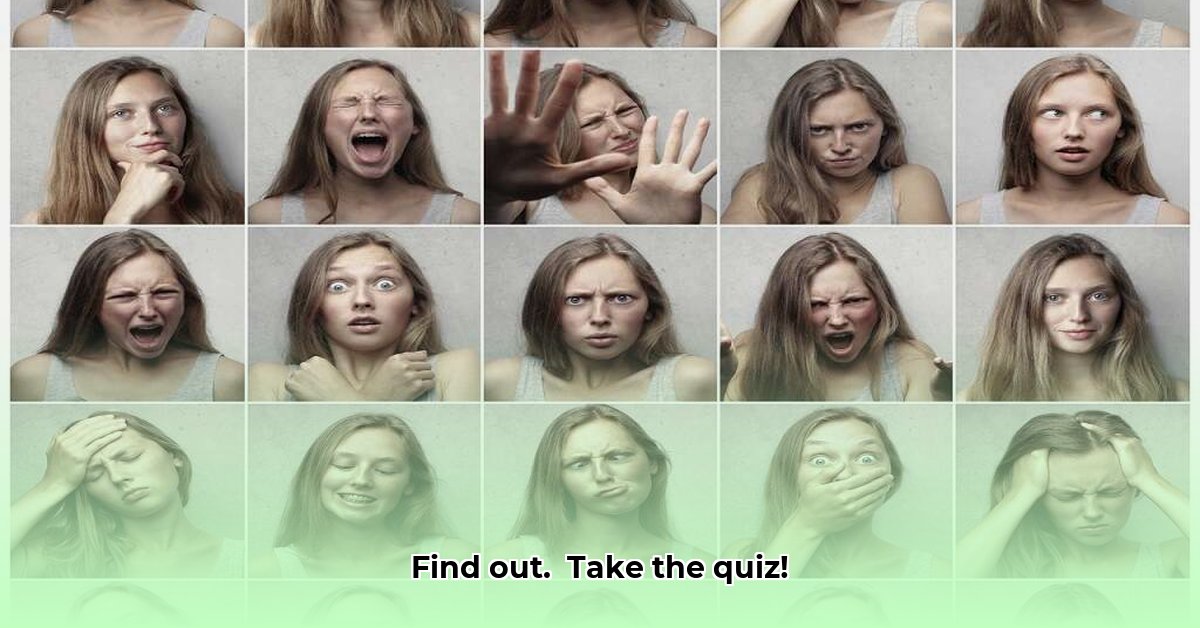Ever clicked on one of those “Am I ugly?” quizzes? They seem like a bit of fun, a quick distraction, right? But have you ever stopped to consider what they’re really doing, or the potential impact they could have? Millions of people take these quizzes, searching for a fast answer to a question that’s far more nuanced than a simple yes or no. This article delves into the world of online beauty tests, dissecting their allure and exploring the psychological minefield they present. We’ll uncover their underlying mechanisms, examine their potential harm to mental well-being, and equip you with strategies to safeguard your self-image. It’s time to cultivate a healthier relationship with yourself – a far more valuable asset than any arbitrary online score.
The Siren Song of “Am I Ugly” Tests: Understanding the Insecurities They Feed On
Let’s be honest, we’ve all been there: scrolling through the internet and stumbling upon an “Am I ugly?” quiz. The temptation is immediate, a seemingly quick and easy route to addressing a nagging insecurity. But are these fleeting internet diversions truly harmless fun, or do they represent something more insidious when it comes to our body image and self-perception? Let’s delve deeper, exploring the psychology that fuels our attraction to these assessments.
The Illusion of Instant Answers: Simplistic Solutions for Complex Issues
These quizzes dangle the promise of a simple solution to a profoundly complex question, offering a brief escape from the pressures of daily life and a temporary reprieve from negative thoughts. They tap into our innate desire for instant gratification and the allure of easy self-assessment, particularly when it comes to our perceived personal value. However, this accessibility comes at a significant cost, potentially distorting our self-perception in subtle yet damaging ways.
The Flawed Logic of Algorithmic Assessment: The Unquantifiable Nature of Beauty
The fundamental flaw lies in the very notion of quantifying beauty. Beauty is inherently subjective, a kaleidoscope of individual preferences and cultural influences. There is no single, objective standard against which to measure attractiveness. These quizzes, relying on often poorly designed and overly simplistic algorithms, attempt to distill something immeasurable into a numerical score. The science simply isn’t there to support such assessments. Consequently, the results are unreliable at best and potentially harmful at worst, contributing to a culture of constant comparison and self-doubt.
Imagine trying to capture the essence of a sunset with a spreadsheet – it’s an impossible task. Beauty is similar. It’s a rich and multifaceted phenomenon that defies simple categorization. These quizzes, with their reductionist methods, invariably miss the mark. They might analyze a few facial features or pose subjective questions, but these are insufficient to gauge something as complex and personal as attractiveness. Furthermore, the inner workings of these algorithms are often shrouded in secrecy, making it difficult to assess their validity or identify potential biases.
The Unforeseen Psychological Impact: Guarding Against Negative Self-Perception
These quizzes, perhaps unintentionally, capitalize on our deepest insecurities, exploiting our fundamental human need for external validation. A negative result can trigger a cascade of negative emotions, potentially undermining self-esteem and even impacting overall mental well-being. It’s absolutely crucial to remember that your self-worth is not, and should never be, determined by a frivolous online quiz. Your value as a human being transcends superficial appearances. Understanding the potential harm of these “Am I ugly” tests is paramount in protecting your mental health.
Consider this: these quizzes often tap into deeply ingrained anxieties about appearance, anxieties that are frequently amplified by social media’s filtered realities and the relentless pursuit of unrealistic beauty standards. This can lead to feelings of inadequacy and self-loathing. A negative outcome can reinforce these anxieties, fostering a destructive cycle of negative self-perception. Instead of boosting confidence, they can inadvertently fuel a relentless pursuit of an unattainable ideal.
Navigating the Online Maze of Quizzes: Weighing Potential Benefits Against Inherent Harms
The internet is awash with websites offering “Am I Ugly?” assessments, each with its own twist on the formula. While some include perfunctory disclaimers about the subjectivity of beauty and the importance of self-worth, their effectiveness is questionable at best. The inherent flaws in the assessment method itself remain the core issue. The fleeting amusement or superficial lightheartedness these quizzes might offer pales in comparison to the potential for negative psychological consequences. Moreover, they often disregard the multifaceted nature of true attractiveness.
A Call for Responsible Design: Potential Improvements and Prioritizing User Well-being
Some argue that these quizzes are simply a harmless source of entertainment, a lighthearted way to pass the time. Others suggest that they could, in theory, serve as a catalyst for self-reflection. While these arguments may hold a degree of merit, the potential for negative consequences far outweighs any perceived benefits. If these quizzes are to exist at all, crucial improvements are needed to mitigate the risks and prioritize user well-being:
- Prioritize entertainment over purported self-assessment: Shift the focus away from providing any semblance of an accurate assessment of attractiveness and concentrate on creating a genuinely fun and engaging experience.
- Integrate readily accessible mental health resources: Include prominent links to reputable resources for individuals struggling with body image issues, low self-esteem, or other mental health concerns. This empowers users to seek help when needed.
- Commit to comprehensive user impact studies: Invest in rigorous research to thoroughly evaluate the psychological effects of these quizzes on a diverse range of users. Use the findings to refine their design and minimize potential harm, thereby improving the overall user experience.
- Transparency in Algorithmic Design: Clearly explain how the quiz arrives at its conclusions, acknowledging the subjective nature of beauty and the limitations of the algorithm.
Cultivating a Healthy Self-Image: Practical Strategies for Navigating Temptation
If you find yourself tempted to take one of these quizzes, keep the following points in mind. By adopting these strategies, you can cultivate a healthier self-image and protect yourself from the potential pitfalls of online beauty assessments:
- Approach these quizzes purely as entertainment: Resist the urge to take the results seriously. Recognize that they are not based on sound scientific principles and should not be used as a basis for self-evaluation. Instead, engage your critical thinking skills and view them as a form of light amusement.
- Practice radical self-compassion: Remind yourself frequently that your inherent worth is not contingent on arbitrary online judgments. Focus on your strengths, accomplishments, and positive attributes. Cultivate gratitude for your unique qualities and resist the urge to let a quiz dictate your self-worth.
- Seek professional guidance for body image concerns: If you struggle with persistent negative thoughts about your appearance, don’t hesitate to seek professional help from a qualified therapist or counselor specializing in body image issues. A professional can provide you with personalized strategies for developing healthier self-perception and addressing underlying anxieties.
- Challenge the urge for external validation: Consciously resist the temptation to seek approval from external sources, whether it’s through online quizzes, social media likes, or the opinions of others. Instead, cultivate a sense of self-acceptance and validation from within.
Redefining Beauty in the Digital Age: Challenging Societal Standards and Embracing Inclusivity
These quizzes are merely a reflection of larger societal issues, particularly the often-unattainable beauty standards perpetuated by media, amplified by social media, and reinforced by the relentless pressure to conform to narrow appearance ideals. We must actively challenge these standards and promote a more inclusive and diverse understanding of beauty that celebrates individuality and embraces authenticity. It is vitally important to remember that true beauty extends far beyond superficial appearances and is unique to each individual. Challenge negative self-talk, question the validity of unrealistic images, and celebrate the beauty in yourself and others. Your worth is not determined by algorithms or online tests; your value is inherent and immeasurable.
- How to Produce Electricity at Home for Energy Independence - January 29, 2026
- How To Create Electricity At Home For Energy Independence - January 28, 2026
- How to Make Electricity at Home Using Renewable Energy Sources - January 27, 2026
















